Literature Review on Open Innovation
VerifiedAdded on 2020/06/04
|11
|2930
|32
AI Summary
This assignment requires you to conduct a comprehensive literature review focusing on open innovation within the bio-pharmaceutical industry. Analyze the organizational modes employed for open innovation in this sector, drawing upon relevant academic publications like those by Bianchi et al. (2011) and Desimone (2011). The review should highlight key trends, challenges, and potential future directions in open innovation practices within the bio-pharmaceutical industry.
Contribute Materials
Your contribution can guide someone’s learning journey. Share your
documents today.
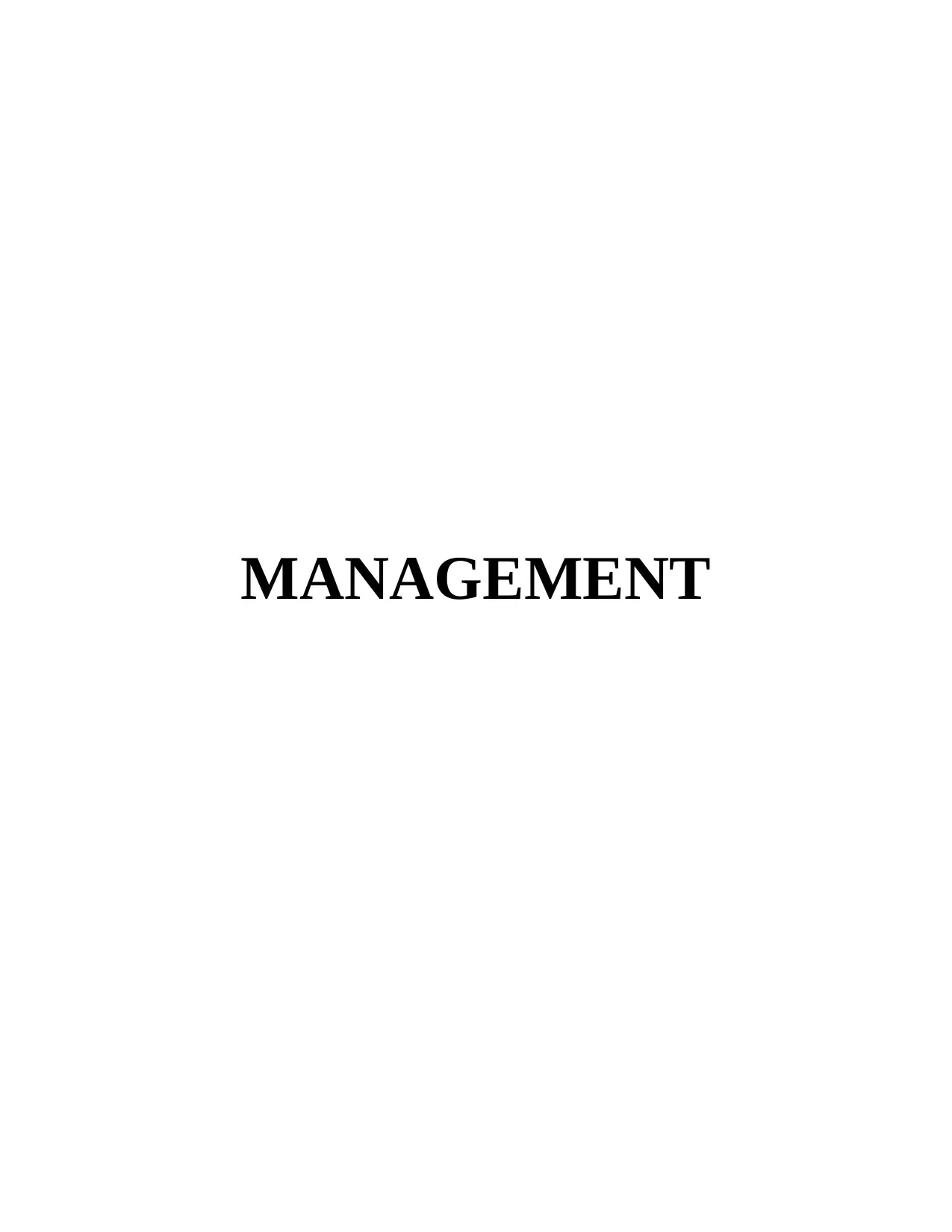
MANAGEMENT
Secure Best Marks with AI Grader
Need help grading? Try our AI Grader for instant feedback on your assignments.
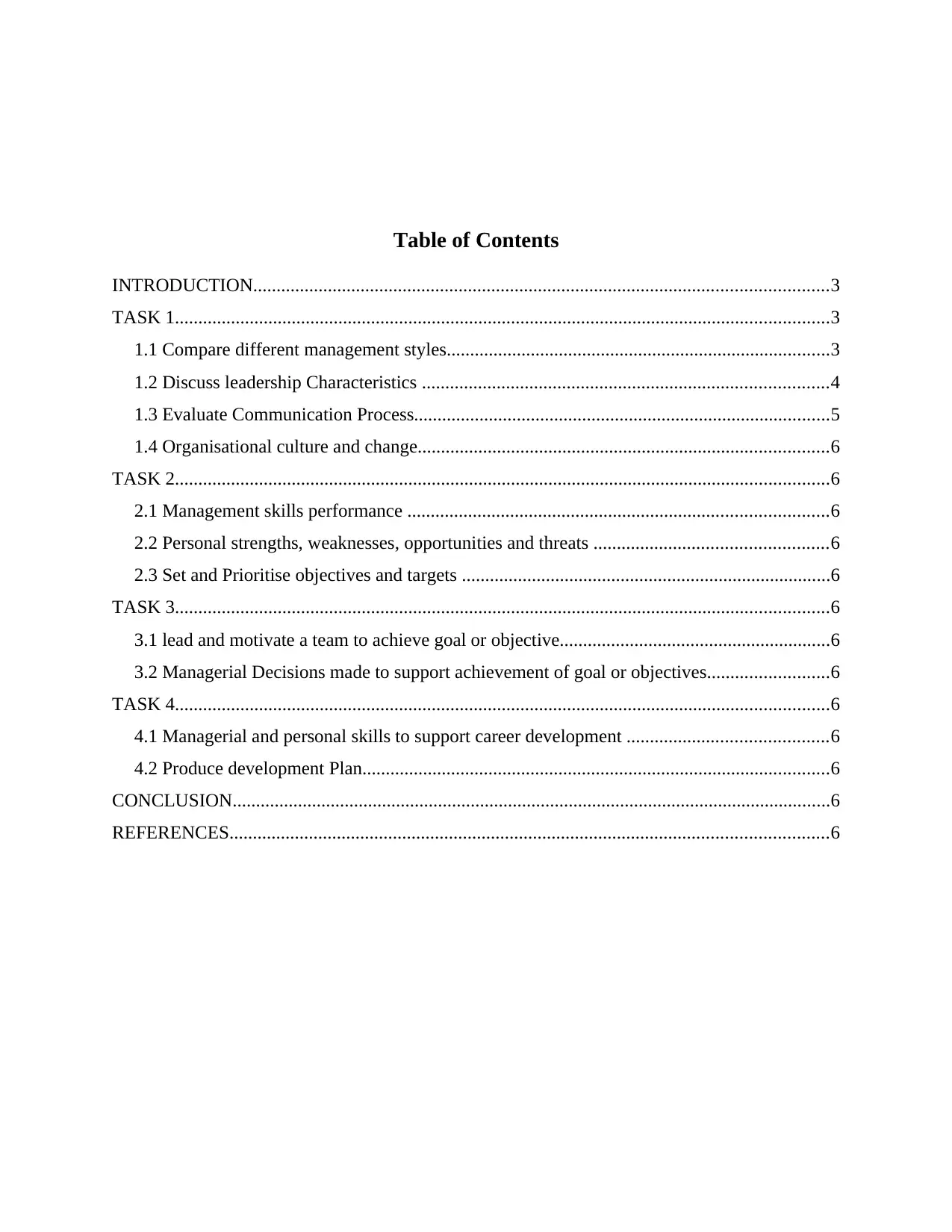
Table of Contents
INTRODUCTION...........................................................................................................................3
TASK 1............................................................................................................................................3
1.1 Compare different management styles..................................................................................3
1.2 Discuss leadership Characteristics .......................................................................................4
1.3 Evaluate Communication Process.........................................................................................5
1.4 Organisational culture and change........................................................................................6
TASK 2............................................................................................................................................6
2.1 Management skills performance ..........................................................................................6
2.2 Personal strengths, weaknesses, opportunities and threats ..................................................6
2.3 Set and Prioritise objectives and targets ...............................................................................6
TASK 3............................................................................................................................................6
3.1 lead and motivate a team to achieve goal or objective..........................................................6
3.2 Managerial Decisions made to support achievement of goal or objectives..........................6
TASK 4............................................................................................................................................6
4.1 Managerial and personal skills to support career development ...........................................6
4.2 Produce development Plan....................................................................................................6
CONCLUSION................................................................................................................................6
REFERENCES................................................................................................................................6
INTRODUCTION...........................................................................................................................3
TASK 1............................................................................................................................................3
1.1 Compare different management styles..................................................................................3
1.2 Discuss leadership Characteristics .......................................................................................4
1.3 Evaluate Communication Process.........................................................................................5
1.4 Organisational culture and change........................................................................................6
TASK 2............................................................................................................................................6
2.1 Management skills performance ..........................................................................................6
2.2 Personal strengths, weaknesses, opportunities and threats ..................................................6
2.3 Set and Prioritise objectives and targets ...............................................................................6
TASK 3............................................................................................................................................6
3.1 lead and motivate a team to achieve goal or objective..........................................................6
3.2 Managerial Decisions made to support achievement of goal or objectives..........................6
TASK 4............................................................................................................................................6
4.1 Managerial and personal skills to support career development ...........................................6
4.2 Produce development Plan....................................................................................................6
CONCLUSION................................................................................................................................6
REFERENCES................................................................................................................................6
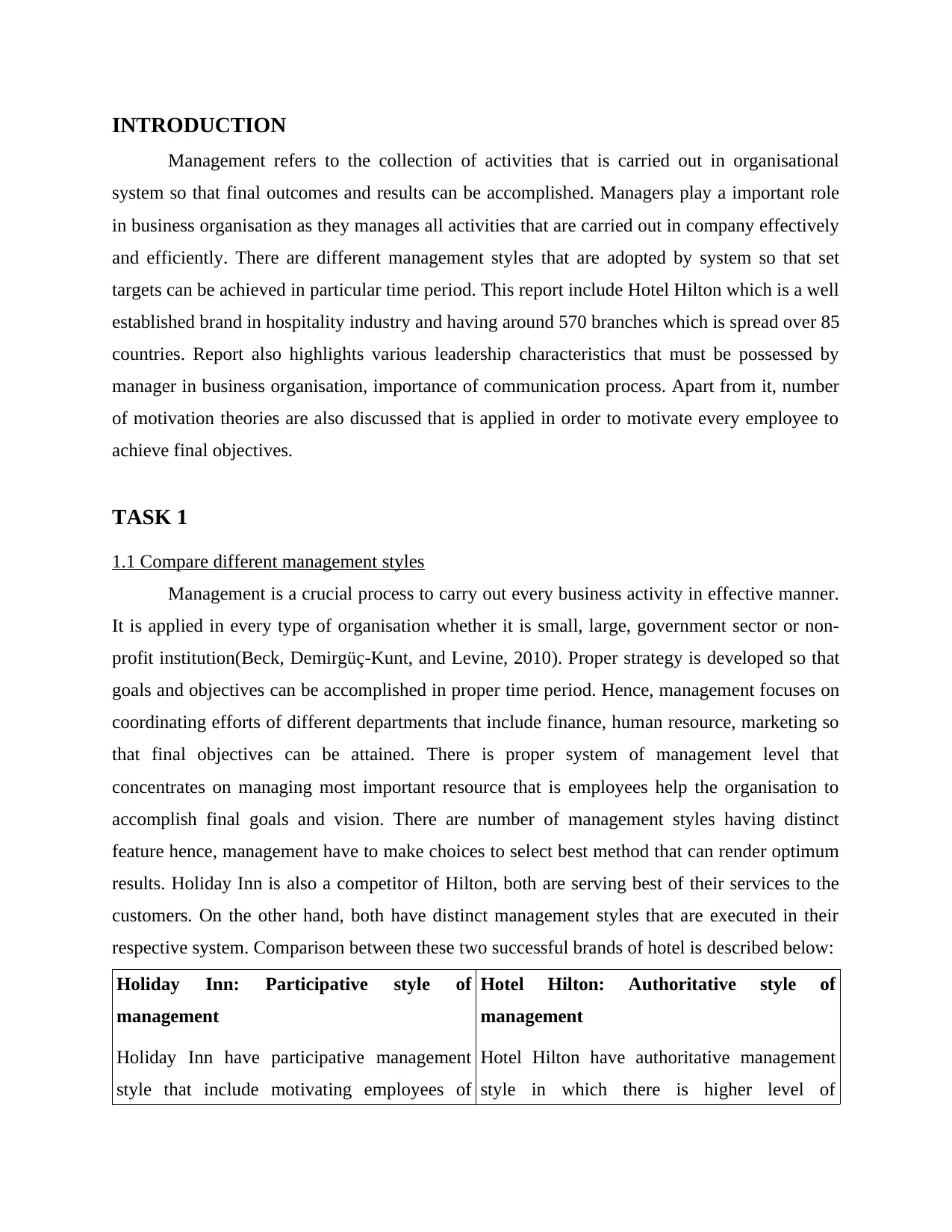
INTRODUCTION
Management refers to the collection of activities that is carried out in organisational
system so that final outcomes and results can be accomplished. Managers play a important role
in business organisation as they manages all activities that are carried out in company effectively
and efficiently. There are different management styles that are adopted by system so that set
targets can be achieved in particular time period. This report include Hotel Hilton which is a well
established brand in hospitality industry and having around 570 branches which is spread over 85
countries. Report also highlights various leadership characteristics that must be possessed by
manager in business organisation, importance of communication process. Apart from it, number
of motivation theories are also discussed that is applied in order to motivate every employee to
achieve final objectives.
TASK 1
1.1 Compare different management styles
Management is a crucial process to carry out every business activity in effective manner.
It is applied in every type of organisation whether it is small, large, government sector or non-
profit institution(Beck, Demirgüç-Kunt, and Levine, 2010). Proper strategy is developed so that
goals and objectives can be accomplished in proper time period. Hence, management focuses on
coordinating efforts of different departments that include finance, human resource, marketing so
that final objectives can be attained. There is proper system of management level that
concentrates on managing most important resource that is employees help the organisation to
accomplish final goals and vision. There are number of management styles having distinct
feature hence, management have to make choices to select best method that can render optimum
results. Holiday Inn is also a competitor of Hilton, both are serving best of their services to the
customers. On the other hand, both have distinct management styles that are executed in their
respective system. Comparison between these two successful brands of hotel is described below:
Holiday Inn: Participative style of
management
Hotel Hilton: Authoritative style of
management
Holiday Inn have participative management
style that include motivating employees of
Hotel Hilton have authoritative management
style in which there is higher level of
Management refers to the collection of activities that is carried out in organisational
system so that final outcomes and results can be accomplished. Managers play a important role
in business organisation as they manages all activities that are carried out in company effectively
and efficiently. There are different management styles that are adopted by system so that set
targets can be achieved in particular time period. This report include Hotel Hilton which is a well
established brand in hospitality industry and having around 570 branches which is spread over 85
countries. Report also highlights various leadership characteristics that must be possessed by
manager in business organisation, importance of communication process. Apart from it, number
of motivation theories are also discussed that is applied in order to motivate every employee to
achieve final objectives.
TASK 1
1.1 Compare different management styles
Management is a crucial process to carry out every business activity in effective manner.
It is applied in every type of organisation whether it is small, large, government sector or non-
profit institution(Beck, Demirgüç-Kunt, and Levine, 2010). Proper strategy is developed so that
goals and objectives can be accomplished in proper time period. Hence, management focuses on
coordinating efforts of different departments that include finance, human resource, marketing so
that final objectives can be attained. There is proper system of management level that
concentrates on managing most important resource that is employees help the organisation to
accomplish final goals and vision. There are number of management styles having distinct
feature hence, management have to make choices to select best method that can render optimum
results. Holiday Inn is also a competitor of Hilton, both are serving best of their services to the
customers. On the other hand, both have distinct management styles that are executed in their
respective system. Comparison between these two successful brands of hotel is described below:
Holiday Inn: Participative style of
management
Hotel Hilton: Authoritative style of
management
Holiday Inn have participative management
style that include motivating employees of
Hotel Hilton have authoritative management
style in which there is higher level of
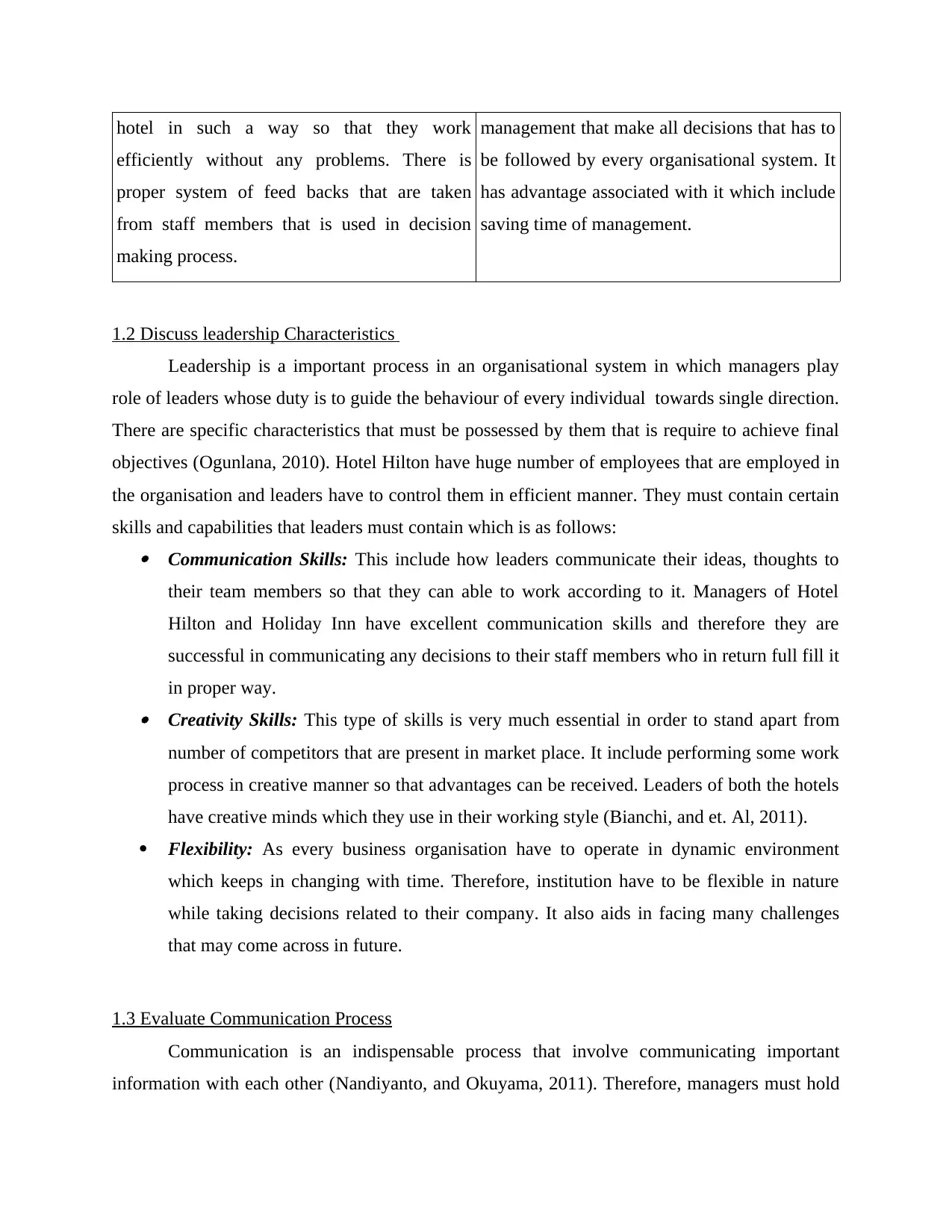
hotel in such a way so that they work
efficiently without any problems. There is
proper system of feed backs that are taken
from staff members that is used in decision
making process.
management that make all decisions that has to
be followed by every organisational system. It
has advantage associated with it which include
saving time of management.
1.2 Discuss leadership Characteristics
Leadership is a important process in an organisational system in which managers play
role of leaders whose duty is to guide the behaviour of every individual towards single direction.
There are specific characteristics that must be possessed by them that is require to achieve final
objectives (Ogunlana, 2010). Hotel Hilton have huge number of employees that are employed in
the organisation and leaders have to control them in efficient manner. They must contain certain
skills and capabilities that leaders must contain which is as follows: Communication Skills: This include how leaders communicate their ideas, thoughts to
their team members so that they can able to work according to it. Managers of Hotel
Hilton and Holiday Inn have excellent communication skills and therefore they are
successful in communicating any decisions to their staff members who in return full fill it
in proper way. Creativity Skills: This type of skills is very much essential in order to stand apart from
number of competitors that are present in market place. It include performing some work
process in creative manner so that advantages can be received. Leaders of both the hotels
have creative minds which they use in their working style (Bianchi, and et. Al, 2011).
Flexibility: As every business organisation have to operate in dynamic environment
which keeps in changing with time. Therefore, institution have to be flexible in nature
while taking decisions related to their company. It also aids in facing many challenges
that may come across in future.
1.3 Evaluate Communication Process
Communication is an indispensable process that involve communicating important
information with each other (Nandiyanto, and Okuyama, 2011). Therefore, managers must hold
efficiently without any problems. There is
proper system of feed backs that are taken
from staff members that is used in decision
making process.
management that make all decisions that has to
be followed by every organisational system. It
has advantage associated with it which include
saving time of management.
1.2 Discuss leadership Characteristics
Leadership is a important process in an organisational system in which managers play
role of leaders whose duty is to guide the behaviour of every individual towards single direction.
There are specific characteristics that must be possessed by them that is require to achieve final
objectives (Ogunlana, 2010). Hotel Hilton have huge number of employees that are employed in
the organisation and leaders have to control them in efficient manner. They must contain certain
skills and capabilities that leaders must contain which is as follows: Communication Skills: This include how leaders communicate their ideas, thoughts to
their team members so that they can able to work according to it. Managers of Hotel
Hilton and Holiday Inn have excellent communication skills and therefore they are
successful in communicating any decisions to their staff members who in return full fill it
in proper way. Creativity Skills: This type of skills is very much essential in order to stand apart from
number of competitors that are present in market place. It include performing some work
process in creative manner so that advantages can be received. Leaders of both the hotels
have creative minds which they use in their working style (Bianchi, and et. Al, 2011).
Flexibility: As every business organisation have to operate in dynamic environment
which keeps in changing with time. Therefore, institution have to be flexible in nature
while taking decisions related to their company. It also aids in facing many challenges
that may come across in future.
1.3 Evaluate Communication Process
Communication is an indispensable process that involve communicating important
information with each other (Nandiyanto, and Okuyama, 2011). Therefore, managers must hold
Secure Best Marks with AI Grader
Need help grading? Try our AI Grader for instant feedback on your assignments.
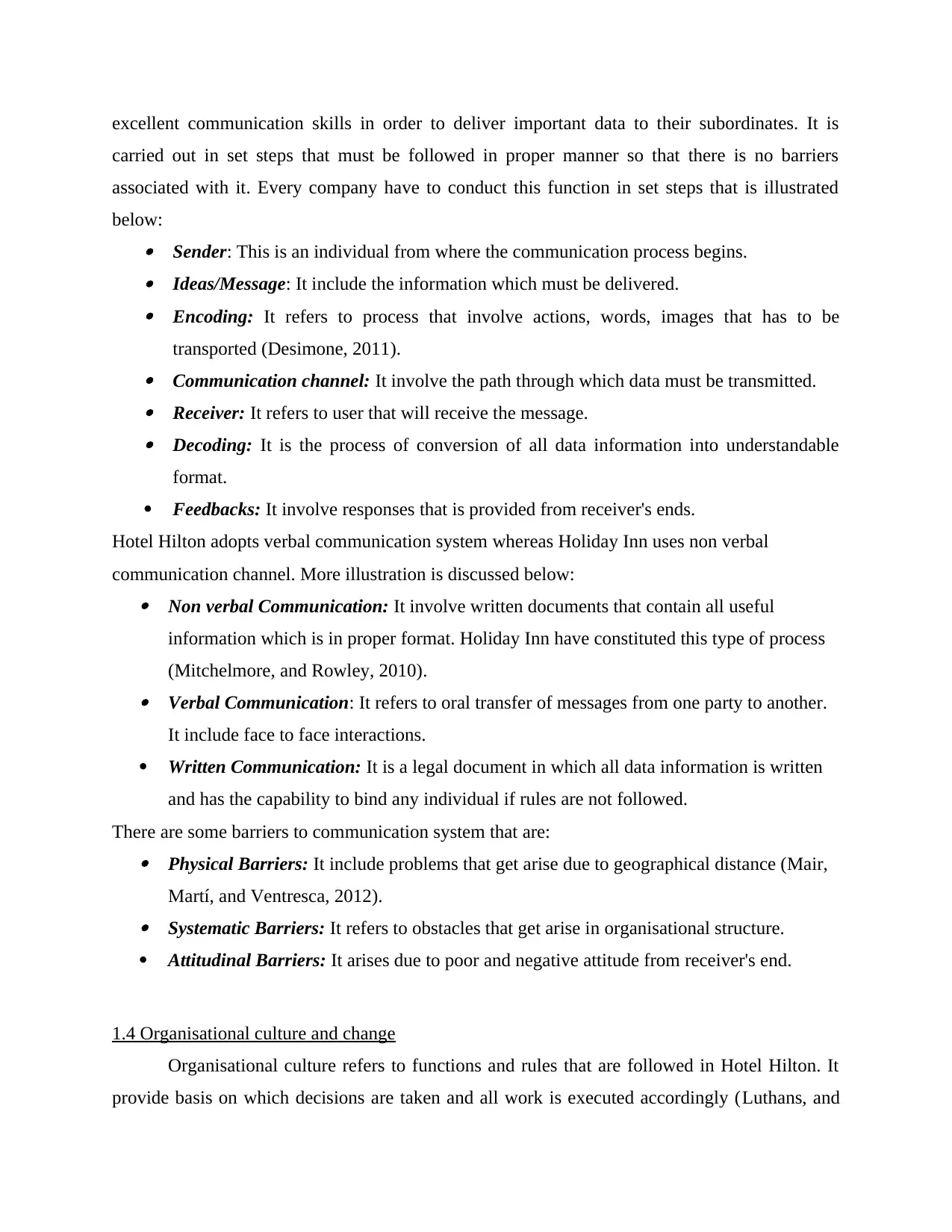
excellent communication skills in order to deliver important data to their subordinates. It is
carried out in set steps that must be followed in proper manner so that there is no barriers
associated with it. Every company have to conduct this function in set steps that is illustrated
below: Sender: This is an individual from where the communication process begins. Ideas/Message: It include the information which must be delivered. Encoding: It refers to process that involve actions, words, images that has to be
transported (Desimone, 2011). Communication channel: It involve the path through which data must be transmitted. Receiver: It refers to user that will receive the message. Decoding: It is the process of conversion of all data information into understandable
format.
Feedbacks: It involve responses that is provided from receiver's ends.
Hotel Hilton adopts verbal communication system whereas Holiday Inn uses non verbal
communication channel. More illustration is discussed below: Non verbal Communication: It involve written documents that contain all useful
information which is in proper format. Holiday Inn have constituted this type of process
(Mitchelmore, and Rowley, 2010). Verbal Communication: It refers to oral transfer of messages from one party to another.
It include face to face interactions.
Written Communication: It is a legal document in which all data information is written
and has the capability to bind any individual if rules are not followed.
There are some barriers to communication system that are: Physical Barriers: It include problems that get arise due to geographical distance (Mair,
Martí, and Ventresca, 2012). Systematic Barriers: It refers to obstacles that get arise in organisational structure.
Attitudinal Barriers: It arises due to poor and negative attitude from receiver's end.
1.4 Organisational culture and change
Organisational culture refers to functions and rules that are followed in Hotel Hilton. It
provide basis on which decisions are taken and all work is executed accordingly (Luthans, and
carried out in set steps that must be followed in proper manner so that there is no barriers
associated with it. Every company have to conduct this function in set steps that is illustrated
below: Sender: This is an individual from where the communication process begins. Ideas/Message: It include the information which must be delivered. Encoding: It refers to process that involve actions, words, images that has to be
transported (Desimone, 2011). Communication channel: It involve the path through which data must be transmitted. Receiver: It refers to user that will receive the message. Decoding: It is the process of conversion of all data information into understandable
format.
Feedbacks: It involve responses that is provided from receiver's ends.
Hotel Hilton adopts verbal communication system whereas Holiday Inn uses non verbal
communication channel. More illustration is discussed below: Non verbal Communication: It involve written documents that contain all useful
information which is in proper format. Holiday Inn have constituted this type of process
(Mitchelmore, and Rowley, 2010). Verbal Communication: It refers to oral transfer of messages from one party to another.
It include face to face interactions.
Written Communication: It is a legal document in which all data information is written
and has the capability to bind any individual if rules are not followed.
There are some barriers to communication system that are: Physical Barriers: It include problems that get arise due to geographical distance (Mair,
Martí, and Ventresca, 2012). Systematic Barriers: It refers to obstacles that get arise in organisational structure.
Attitudinal Barriers: It arises due to poor and negative attitude from receiver's end.
1.4 Organisational culture and change
Organisational culture refers to functions and rules that are followed in Hotel Hilton. It
provide basis on which decisions are taken and all work is executed accordingly (Luthans, and
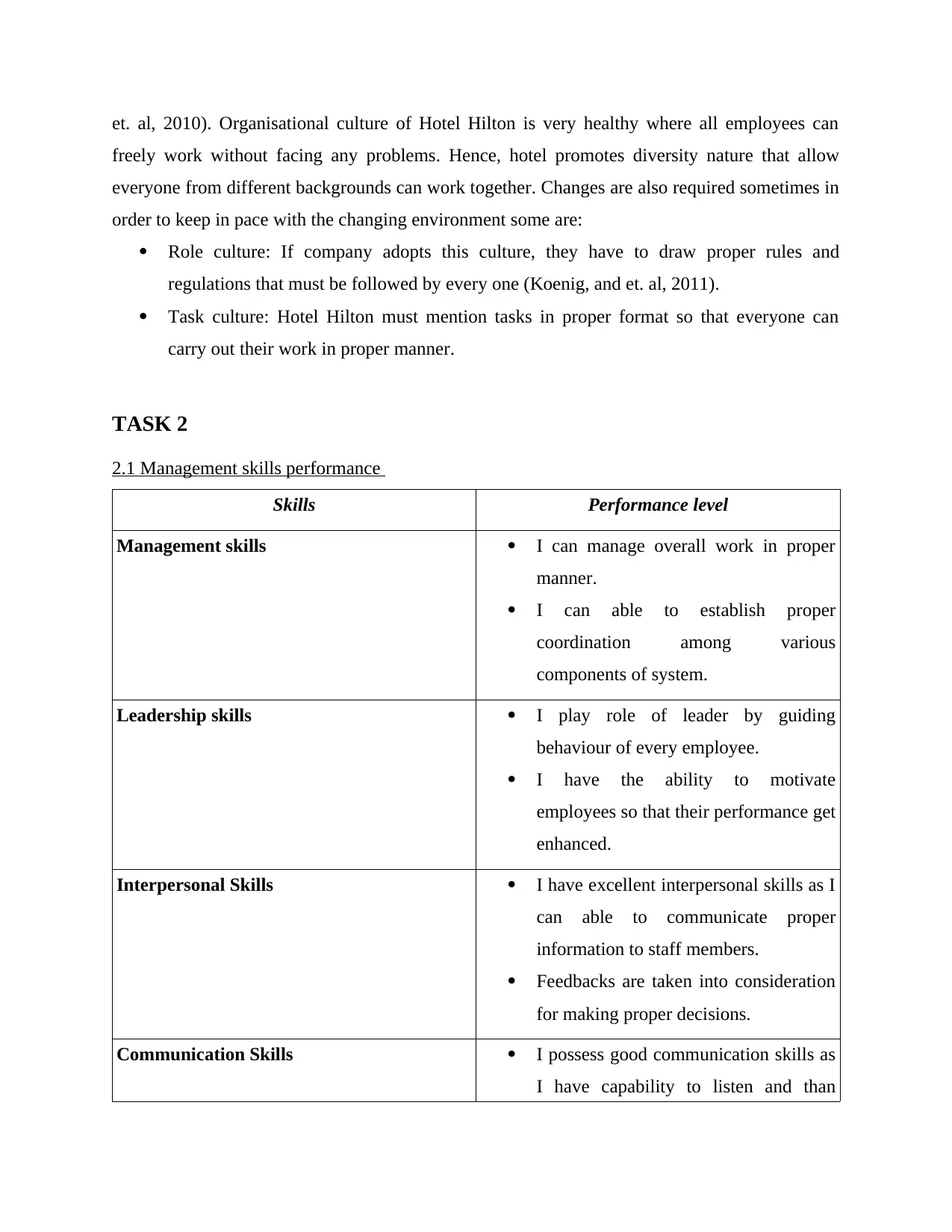
et. al, 2010). Organisational culture of Hotel Hilton is very healthy where all employees can
freely work without facing any problems. Hence, hotel promotes diversity nature that allow
everyone from different backgrounds can work together. Changes are also required sometimes in
order to keep in pace with the changing environment some are:
Role culture: If company adopts this culture, they have to draw proper rules and
regulations that must be followed by every one (Koenig, and et. al, 2011).
Task culture: Hotel Hilton must mention tasks in proper format so that everyone can
carry out their work in proper manner.
TASK 2
2.1 Management skills performance
Skills Performance level
Management skills I can manage overall work in proper
manner.
I can able to establish proper
coordination among various
components of system.
Leadership skills I play role of leader by guiding
behaviour of every employee.
I have the ability to motivate
employees so that their performance get
enhanced.
Interpersonal Skills I have excellent interpersonal skills as I
can able to communicate proper
information to staff members.
Feedbacks are taken into consideration
for making proper decisions.
Communication Skills I possess good communication skills as
I have capability to listen and than
freely work without facing any problems. Hence, hotel promotes diversity nature that allow
everyone from different backgrounds can work together. Changes are also required sometimes in
order to keep in pace with the changing environment some are:
Role culture: If company adopts this culture, they have to draw proper rules and
regulations that must be followed by every one (Koenig, and et. al, 2011).
Task culture: Hotel Hilton must mention tasks in proper format so that everyone can
carry out their work in proper manner.
TASK 2
2.1 Management skills performance
Skills Performance level
Management skills I can manage overall work in proper
manner.
I can able to establish proper
coordination among various
components of system.
Leadership skills I play role of leader by guiding
behaviour of every employee.
I have the ability to motivate
employees so that their performance get
enhanced.
Interpersonal Skills I have excellent interpersonal skills as I
can able to communicate proper
information to staff members.
Feedbacks are taken into consideration
for making proper decisions.
Communication Skills I possess good communication skills as
I have capability to listen and than
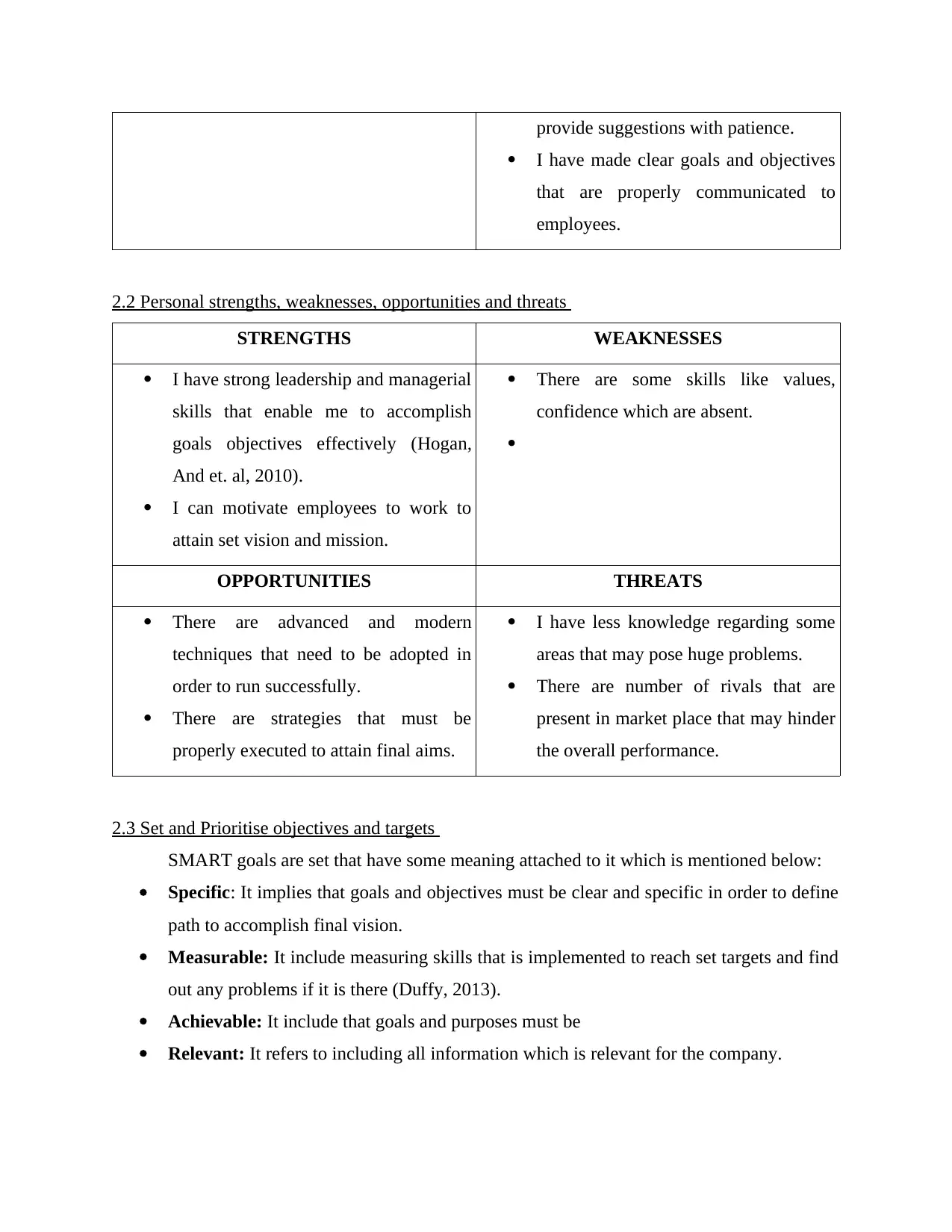
provide suggestions with patience.
I have made clear goals and objectives
that are properly communicated to
employees.
2.2 Personal strengths, weaknesses, opportunities and threats
STRENGTHS WEAKNESSES
I have strong leadership and managerial
skills that enable me to accomplish
goals objectives effectively (Hogan,
And et. al, 2010).
I can motivate employees to work to
attain set vision and mission.
There are some skills like values,
confidence which are absent.
OPPORTUNITIES THREATS
There are advanced and modern
techniques that need to be adopted in
order to run successfully.
There are strategies that must be
properly executed to attain final aims.
I have less knowledge regarding some
areas that may pose huge problems.
There are number of rivals that are
present in market place that may hinder
the overall performance.
2.3 Set and Prioritise objectives and targets
SMART goals are set that have some meaning attached to it which is mentioned below:
Specific: It implies that goals and objectives must be clear and specific in order to define
path to accomplish final vision.
Measurable: It include measuring skills that is implemented to reach set targets and find
out any problems if it is there (Duffy, 2013).
Achievable: It include that goals and purposes must be
Relevant: It refers to including all information which is relevant for the company.
I have made clear goals and objectives
that are properly communicated to
employees.
2.2 Personal strengths, weaknesses, opportunities and threats
STRENGTHS WEAKNESSES
I have strong leadership and managerial
skills that enable me to accomplish
goals objectives effectively (Hogan,
And et. al, 2010).
I can motivate employees to work to
attain set vision and mission.
There are some skills like values,
confidence which are absent.
OPPORTUNITIES THREATS
There are advanced and modern
techniques that need to be adopted in
order to run successfully.
There are strategies that must be
properly executed to attain final aims.
I have less knowledge regarding some
areas that may pose huge problems.
There are number of rivals that are
present in market place that may hinder
the overall performance.
2.3 Set and Prioritise objectives and targets
SMART goals are set that have some meaning attached to it which is mentioned below:
Specific: It implies that goals and objectives must be clear and specific in order to define
path to accomplish final vision.
Measurable: It include measuring skills that is implemented to reach set targets and find
out any problems if it is there (Duffy, 2013).
Achievable: It include that goals and purposes must be
Relevant: It refers to including all information which is relevant for the company.
Paraphrase This Document
Need a fresh take? Get an instant paraphrase of this document with our AI Paraphraser
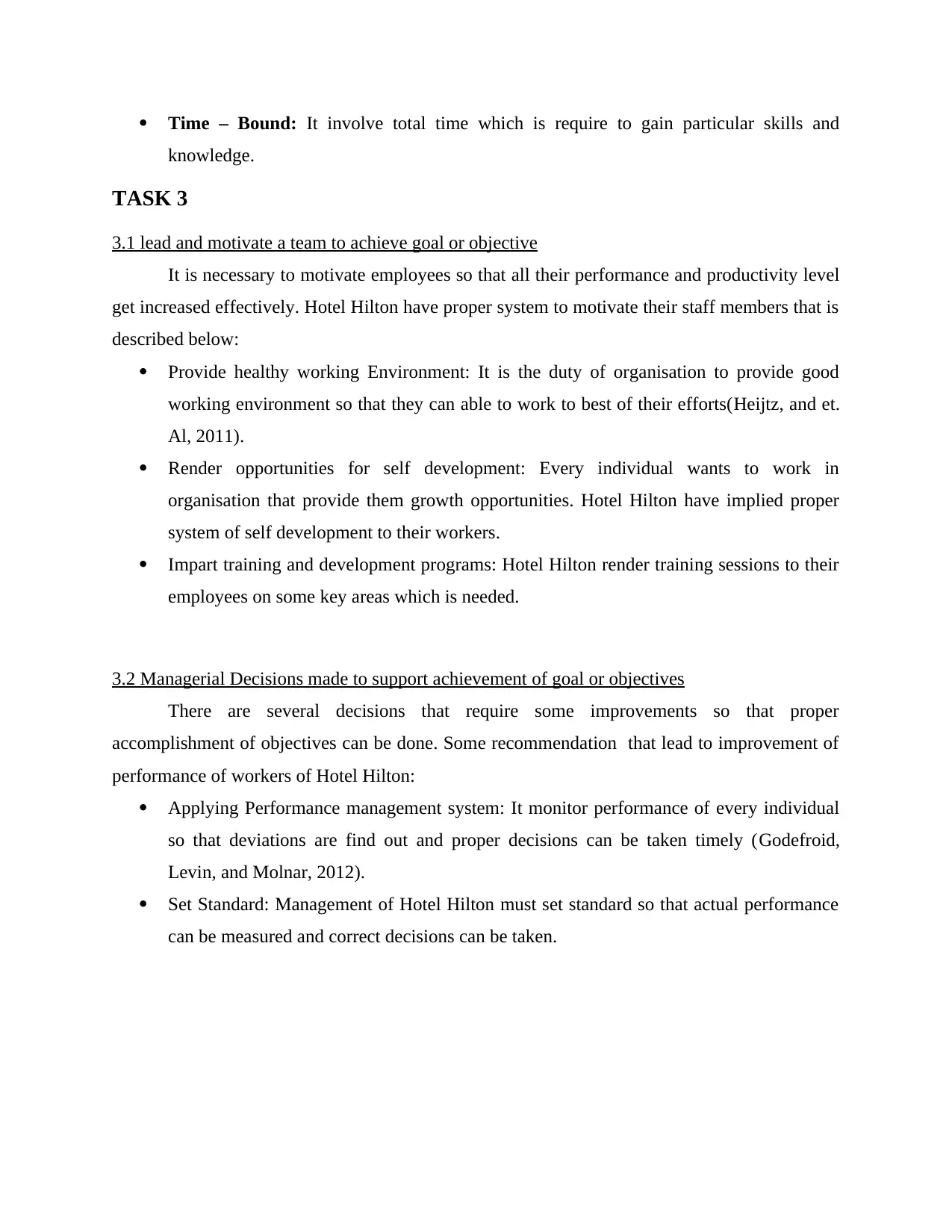
Time – Bound: It involve total time which is require to gain particular skills and
knowledge.
TASK 3
3.1 lead and motivate a team to achieve goal or objective
It is necessary to motivate employees so that all their performance and productivity level
get increased effectively. Hotel Hilton have proper system to motivate their staff members that is
described below:
Provide healthy working Environment: It is the duty of organisation to provide good
working environment so that they can able to work to best of their efforts(Heijtz, and et.
Al, 2011).
Render opportunities for self development: Every individual wants to work in
organisation that provide them growth opportunities. Hotel Hilton have implied proper
system of self development to their workers.
Impart training and development programs: Hotel Hilton render training sessions to their
employees on some key areas which is needed.
3.2 Managerial Decisions made to support achievement of goal or objectives
There are several decisions that require some improvements so that proper
accomplishment of objectives can be done. Some recommendation that lead to improvement of
performance of workers of Hotel Hilton:
Applying Performance management system: It monitor performance of every individual
so that deviations are find out and proper decisions can be taken timely (Godefroid,
Levin, and Molnar, 2012).
Set Standard: Management of Hotel Hilton must set standard so that actual performance
can be measured and correct decisions can be taken.
knowledge.
TASK 3
3.1 lead and motivate a team to achieve goal or objective
It is necessary to motivate employees so that all their performance and productivity level
get increased effectively. Hotel Hilton have proper system to motivate their staff members that is
described below:
Provide healthy working Environment: It is the duty of organisation to provide good
working environment so that they can able to work to best of their efforts(Heijtz, and et.
Al, 2011).
Render opportunities for self development: Every individual wants to work in
organisation that provide them growth opportunities. Hotel Hilton have implied proper
system of self development to their workers.
Impart training and development programs: Hotel Hilton render training sessions to their
employees on some key areas which is needed.
3.2 Managerial Decisions made to support achievement of goal or objectives
There are several decisions that require some improvements so that proper
accomplishment of objectives can be done. Some recommendation that lead to improvement of
performance of workers of Hotel Hilton:
Applying Performance management system: It monitor performance of every individual
so that deviations are find out and proper decisions can be taken timely (Godefroid,
Levin, and Molnar, 2012).
Set Standard: Management of Hotel Hilton must set standard so that actual performance
can be measured and correct decisions can be taken.
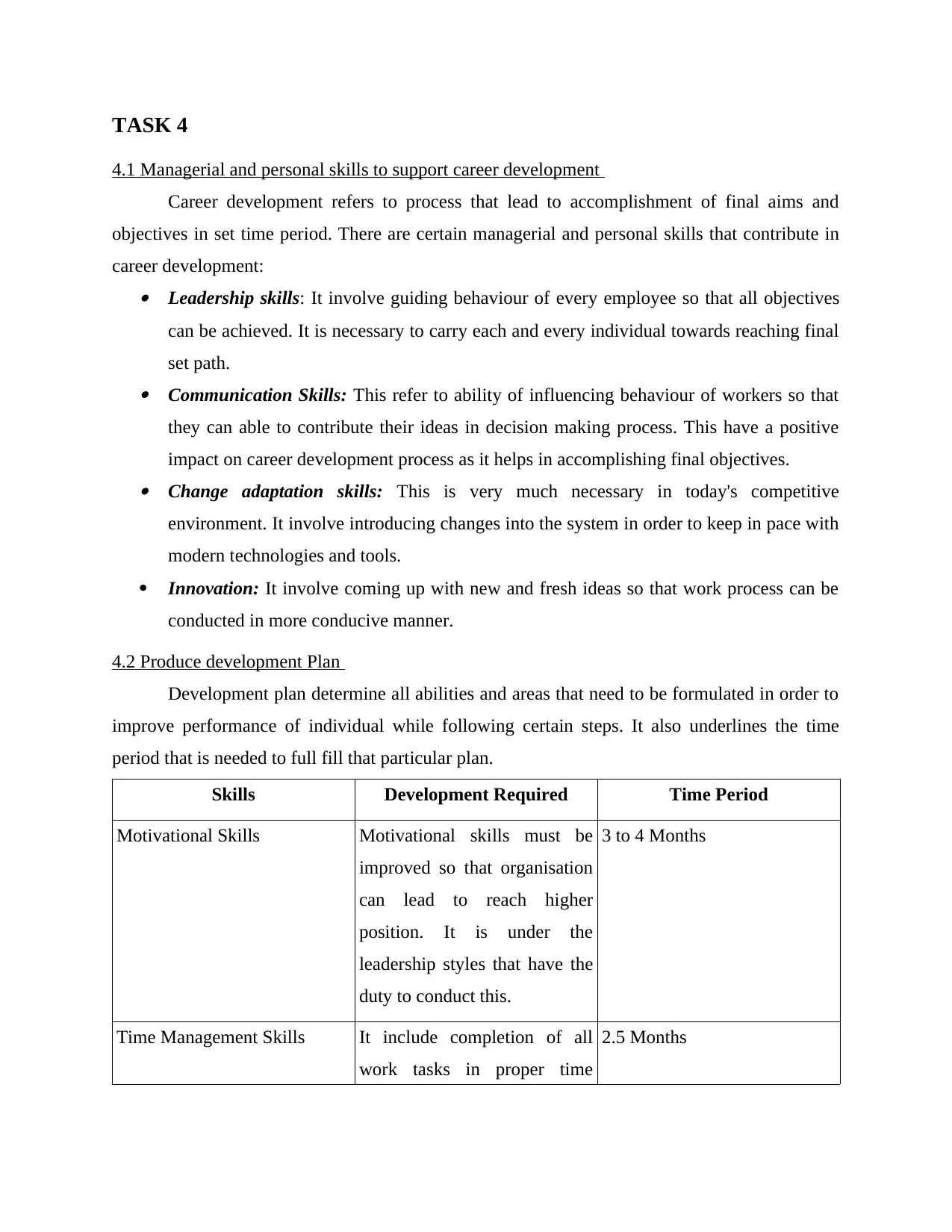
TASK 4
4.1 Managerial and personal skills to support career development
Career development refers to process that lead to accomplishment of final aims and
objectives in set time period. There are certain managerial and personal skills that contribute in
career development: Leadership skills: It involve guiding behaviour of every employee so that all objectives
can be achieved. It is necessary to carry each and every individual towards reaching final
set path. Communication Skills: This refer to ability of influencing behaviour of workers so that
they can able to contribute their ideas in decision making process. This have a positive
impact on career development process as it helps in accomplishing final objectives. Change adaptation skills: This is very much necessary in today's competitive
environment. It involve introducing changes into the system in order to keep in pace with
modern technologies and tools.
Innovation: It involve coming up with new and fresh ideas so that work process can be
conducted in more conducive manner.
4.2 Produce development Plan
Development plan determine all abilities and areas that need to be formulated in order to
improve performance of individual while following certain steps. It also underlines the time
period that is needed to full fill that particular plan.
Skills Development Required Time Period
Motivational Skills Motivational skills must be
improved so that organisation
can lead to reach higher
position. It is under the
leadership styles that have the
duty to conduct this.
3 to 4 Months
Time Management Skills It include completion of all
work tasks in proper time
2.5 Months
4.1 Managerial and personal skills to support career development
Career development refers to process that lead to accomplishment of final aims and
objectives in set time period. There are certain managerial and personal skills that contribute in
career development: Leadership skills: It involve guiding behaviour of every employee so that all objectives
can be achieved. It is necessary to carry each and every individual towards reaching final
set path. Communication Skills: This refer to ability of influencing behaviour of workers so that
they can able to contribute their ideas in decision making process. This have a positive
impact on career development process as it helps in accomplishing final objectives. Change adaptation skills: This is very much necessary in today's competitive
environment. It involve introducing changes into the system in order to keep in pace with
modern technologies and tools.
Innovation: It involve coming up with new and fresh ideas so that work process can be
conducted in more conducive manner.
4.2 Produce development Plan
Development plan determine all abilities and areas that need to be formulated in order to
improve performance of individual while following certain steps. It also underlines the time
period that is needed to full fill that particular plan.
Skills Development Required Time Period
Motivational Skills Motivational skills must be
improved so that organisation
can lead to reach higher
position. It is under the
leadership styles that have the
duty to conduct this.
3 to 4 Months
Time Management Skills It include completion of all
work tasks in proper time
2.5 Months
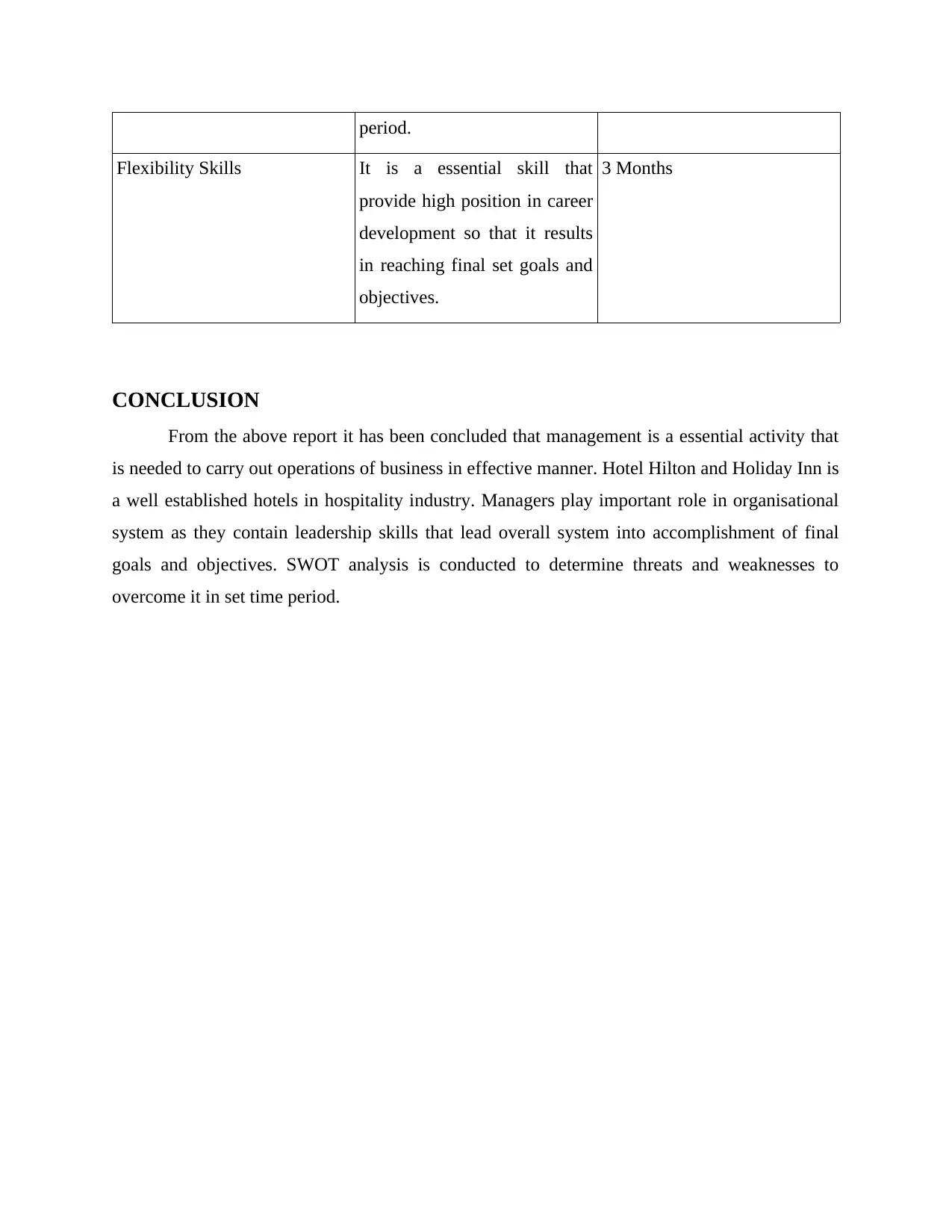
period.
Flexibility Skills It is a essential skill that
provide high position in career
development so that it results
in reaching final set goals and
objectives.
3 Months
CONCLUSION
From the above report it has been concluded that management is a essential activity that
is needed to carry out operations of business in effective manner. Hotel Hilton and Holiday Inn is
a well established hotels in hospitality industry. Managers play important role in organisational
system as they contain leadership skills that lead overall system into accomplishment of final
goals and objectives. SWOT analysis is conducted to determine threats and weaknesses to
overcome it in set time period.
Flexibility Skills It is a essential skill that
provide high position in career
development so that it results
in reaching final set goals and
objectives.
3 Months
CONCLUSION
From the above report it has been concluded that management is a essential activity that
is needed to carry out operations of business in effective manner. Hotel Hilton and Holiday Inn is
a well established hotels in hospitality industry. Managers play important role in organisational
system as they contain leadership skills that lead overall system into accomplishment of final
goals and objectives. SWOT analysis is conducted to determine threats and weaknesses to
overcome it in set time period.
Secure Best Marks with AI Grader
Need help grading? Try our AI Grader for instant feedback on your assignments.
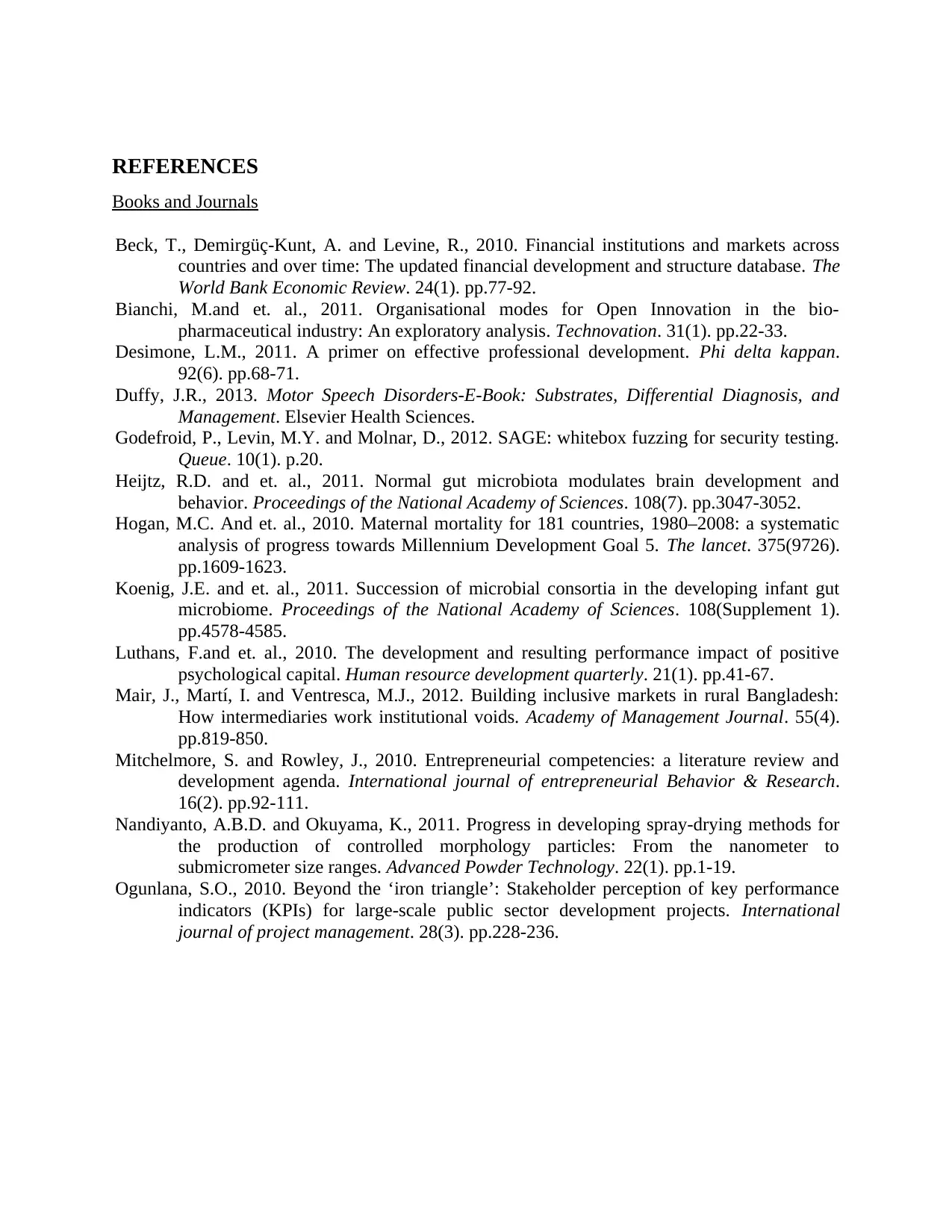
REFERENCES
Books and Journals
Beck, T., Demirgüç-Kunt, A. and Levine, R., 2010. Financial institutions and markets across
countries and over time: The updated financial development and structure database. The
World Bank Economic Review. 24(1). pp.77-92.
Bianchi, M.and et. al., 2011. Organisational modes for Open Innovation in the bio-
pharmaceutical industry: An exploratory analysis. Technovation. 31(1). pp.22-33.
Desimone, L.M., 2011. A primer on effective professional development. Phi delta kappan.
92(6). pp.68-71.
Duffy, J.R., 2013. Motor Speech Disorders-E-Book: Substrates, Differential Diagnosis, and
Management. Elsevier Health Sciences.
Godefroid, P., Levin, M.Y. and Molnar, D., 2012. SAGE: whitebox fuzzing for security testing.
Queue. 10(1). p.20.
Heijtz, R.D. and et. al., 2011. Normal gut microbiota modulates brain development and
behavior. Proceedings of the National Academy of Sciences. 108(7). pp.3047-3052.
Hogan, M.C. And et. al., 2010. Maternal mortality for 181 countries, 1980–2008: a systematic
analysis of progress towards Millennium Development Goal 5. The lancet. 375(9726).
pp.1609-1623.
Koenig, J.E. and et. al., 2011. Succession of microbial consortia in the developing infant gut
microbiome. Proceedings of the National Academy of Sciences. 108(Supplement 1).
pp.4578-4585.
Luthans, F.and et. al., 2010. The development and resulting performance impact of positive
psychological capital. Human resource development quarterly. 21(1). pp.41-67.
Mair, J., Martí, I. and Ventresca, M.J., 2012. Building inclusive markets in rural Bangladesh:
How intermediaries work institutional voids. Academy of Management Journal. 55(4).
pp.819-850.
Mitchelmore, S. and Rowley, J., 2010. Entrepreneurial competencies: a literature review and
development agenda. International journal of entrepreneurial Behavior & Research.
16(2). pp.92-111.
Nandiyanto, A.B.D. and Okuyama, K., 2011. Progress in developing spray-drying methods for
the production of controlled morphology particles: From the nanometer to
submicrometer size ranges. Advanced Powder Technology. 22(1). pp.1-19.
Ogunlana, S.O., 2010. Beyond the ‘iron triangle’: Stakeholder perception of key performance
indicators (KPIs) for large-scale public sector development projects. International
journal of project management. 28(3). pp.228-236.
Books and Journals
Beck, T., Demirgüç-Kunt, A. and Levine, R., 2010. Financial institutions and markets across
countries and over time: The updated financial development and structure database. The
World Bank Economic Review. 24(1). pp.77-92.
Bianchi, M.and et. al., 2011. Organisational modes for Open Innovation in the bio-
pharmaceutical industry: An exploratory analysis. Technovation. 31(1). pp.22-33.
Desimone, L.M., 2011. A primer on effective professional development. Phi delta kappan.
92(6). pp.68-71.
Duffy, J.R., 2013. Motor Speech Disorders-E-Book: Substrates, Differential Diagnosis, and
Management. Elsevier Health Sciences.
Godefroid, P., Levin, M.Y. and Molnar, D., 2012. SAGE: whitebox fuzzing for security testing.
Queue. 10(1). p.20.
Heijtz, R.D. and et. al., 2011. Normal gut microbiota modulates brain development and
behavior. Proceedings of the National Academy of Sciences. 108(7). pp.3047-3052.
Hogan, M.C. And et. al., 2010. Maternal mortality for 181 countries, 1980–2008: a systematic
analysis of progress towards Millennium Development Goal 5. The lancet. 375(9726).
pp.1609-1623.
Koenig, J.E. and et. al., 2011. Succession of microbial consortia in the developing infant gut
microbiome. Proceedings of the National Academy of Sciences. 108(Supplement 1).
pp.4578-4585.
Luthans, F.and et. al., 2010. The development and resulting performance impact of positive
psychological capital. Human resource development quarterly. 21(1). pp.41-67.
Mair, J., Martí, I. and Ventresca, M.J., 2012. Building inclusive markets in rural Bangladesh:
How intermediaries work institutional voids. Academy of Management Journal. 55(4).
pp.819-850.
Mitchelmore, S. and Rowley, J., 2010. Entrepreneurial competencies: a literature review and
development agenda. International journal of entrepreneurial Behavior & Research.
16(2). pp.92-111.
Nandiyanto, A.B.D. and Okuyama, K., 2011. Progress in developing spray-drying methods for
the production of controlled morphology particles: From the nanometer to
submicrometer size ranges. Advanced Powder Technology. 22(1). pp.1-19.
Ogunlana, S.O., 2010. Beyond the ‘iron triangle’: Stakeholder perception of key performance
indicators (KPIs) for large-scale public sector development projects. International
journal of project management. 28(3). pp.228-236.
1 out of 11
Related Documents
Your All-in-One AI-Powered Toolkit for Academic Success.
+13062052269
info@desklib.com
Available 24*7 on WhatsApp / Email
![[object Object]](/_next/static/media/star-bottom.7253800d.svg)
Unlock your academic potential
© 2024 | Zucol Services PVT LTD | All rights reserved.





